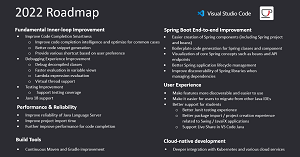News
Java on Visual Studio Code Going Cloud Native
Cloud-native development figures prominently in a new roadmap published by Microsoft's Java on Visual Studio Code dev team.
The company, which claims "we use more Java than one can imagine" and champions the language for development in its Azure cloud computing platform, published the roadmap in a Jan. 20 blog post.
As part of its duties, the Java dev team maintains extensions, including the Extension Pack for Java, which bundles six individual extensions that provide the VS Code Java experience.
 [Click on image for larger view.] Java on VS Code 2022 Roadmap (source: Microsoft).
[Click on image for larger view.] Java on VS Code 2022 Roadmap (source: Microsoft).
The roadmap shows that one of the of the top areas of investment planned for Java on Visual Studio Code for 2022 is cloud-native development.
But what is cloud-native development?
Well, according the Cloud Native Computing Foundation (CNCF), the definition is:
Cloud native technologies empower organizations to build and run scalable applications in modern, dynamic environments such as public, private, and hybrid clouds. Containers, service meshes, microservices, immutable infrastructure, and declarative APIs exemplify this approach.
These techniques enable loosely coupled systems that are resilient, manageable, and observable. Combined with robust automation, they allow engineers to make high-impact changes frequently and predictably with minimal toil.
"Cloud-native has been one of the most popular topics recently in the software development industry," said Nick Zhu, senior program manager, Developer Division. "With cloud-native development approach, developers need to deal with microservices, cloud platforms, Kubernetes and so on."
He cited VS Code's remote development extensions and GitHub Codespaces as integral tools for improving the Java experience in the popular code editor. GitHub Codespaces was spawned from the old Visual Studio Online project that provided "cloud-hosted dev environments accessible from anywhere."
"To address developer's need in this area, we plan to explore deeper integration with Kubernetes in general and interaction with different cloud services (such as Azure Spring Cloud)," Zhu said.
Speaking of Azure Spring Cloud, Zhu also noted a focus on Spring Boot end-to-end support.
"Spring Boot framework is one of the most popular Java frameworks and it allows developers to easily build a microservice or web application," Zhu said, referencing the Spring Boot Extension Pack that optimizes Spring development experience in VS Code. "But we have heard asks from the Spring developer community and think we can do more. We will make improvements to both core Java extensions and Spring extensions in collaboration with VMWare." Improvement areas include:
- Easier creation workflow of Spring projects, controllers and beans
- Better visualization of core Spring concepts (such as beans and API mappings)
- Boilerplate code generation for Spring controllers and classes
- Improved Spring application lifecycle management in Spring Boot dashboard
- More intuitive experience to add Spring libraries when managing dependencies
Other top areas of investment include:
- Fundamental inner-loop development experience: The team will improve the "smartness" of code completion suggestions, provide more relevant code snippet generation and offer shortcuts based on user's preference, including "syso" and "sout."
- Performance and reliability: Reliability of Java Language Server will be improved and unresponsiveness will be reduced.
- Build tools: The team will add new features to the Gradle for Java extension as well as improve the Maven extension to enhance build and dependency management, which is said to be especially important for large and multi-module projects.
- User experience: Many developers last year complained that they ended up asking for a feature to be implemented only to find such a feature already exists but they weren't aware of it. "Therefore, making features easier to use and more discoverable will be our focus in this area."
Zhu also noted significant user growth in the number of Java developers using VS Code last year, bringing the total to more than 1.5 million. Further speaking to the popularity of Java on VS Code, the aforementioned Extension Pack for Java -- still in the preview stage -- has been installed more than 11 million times.
He also detailed a couple new feature updates in the team's first post of 2022, including embedding Java Runtime Environments (JREs) into extensions and changes to the way developers can change formatter settings and preview the effects.
About the Author
David Ramel is an editor and writer at Converge 360.